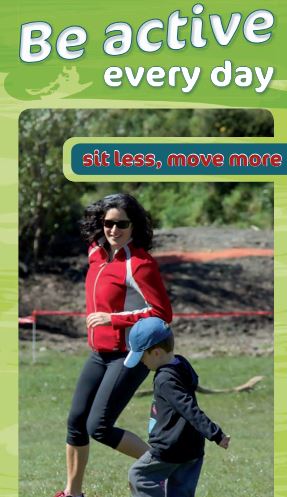If you're a frequent visitor to Healthify, why not share our site with a friend? Don't forget you can also browse Healthify without using your phone data.
Heart health and physical activity
Physical activity and your heart
Key points about physical activity and your heart
- Physical activity is any movement you do – from cleaning, to jogging, using the stairs or working in the garden.
- The more you move, the better it is for your heart.
- Just 30 minutes or more of moderate physical activity on most days of the week will improve your heart health.

Physical activity has many heart health benefits. These include:
- Reducing your risk of developing cardiovascular disease, eg, heart attack and stroke – by lowering your blood pressure and triglycerides (a kind of fat in your bloodstream).
- Improving your cholesterol.
- Helping with weight loss and maintaining a healthy weight, along with a healthy diet. Being overweight puts extra stress on your heart.
- Controlling your blood glucose level – exercise can stop or slow the development of diabetes.
- Possibly helping you to stop smoking – fit people are less likely to smoke and smoking is a major risk for cardiovascular events like heart attacks and strokes.
- Helping you sleep better and feel less stressed.
- Building muscles – stronger muscles are better at getting oxygen from your bloodstream meaning your heart doesn't have to work so hard.
- Reduces levels of C-reactive protein (CRP) – a sign of inflammation which is an increased risk for heart disease.
There are 3 different levels of physical activity – light, moderate and vigorous. Light keeps you moving gently, moderate improves your overall health and vigorous challenges your body, improving your fitness. Together, they create a balanced approach to staying active.
Light activity
This is any kind of movement that doesn’t change your breathing. It includes everyday activities like taking a leisurely walk or cooking dinner. You’ll be able to do these activities for a long time without tiring.
Moderate activity
You may have been told you should be doing moderate activity, but what exactly is it? Moderate physical activity is exercise that makes your heart beat faster and causes you to breathe a bit harder. A simple way to check if you’re doing it right is by using the ‘talk test’:
- When you're exercising, you should notice you're breathing harder, but you should still be able to chat with someone. This is where you want to be.
- If you can sing a song while you're exercising then you’re not working hard enough. Step it up and try to make your exercise a little more challenging.
- If you're so out of breath you can't chat while exercising it means you're overdoing it, so slow it down.
Vigorous activity
Vigorous physical activity is when you’re really putting in effort, and it makes you breathe hard and fast. You’ll know you’re doing it when your heart rate is up, you’re sweating and find yourself unable to say more than a few words without stopping for breath. Your muscles will get tired more quickly and you'll find you can't do this type of exercise for long periods of time.
Examples of light, moderate and vigorous activities
| Light physical activity | Moderate physical activity | Vigorous physical activity |
| Slow walking, hanging out the washing, vacuuming | Brisk walking or hiking | High intensity interval training (HIIT) |
| Indoor bowls | Lawn bowls | Running or skipping |
| A stretch session | Gentle water aerobics | Playing sports, eg, netball, soccer and rugby |
| Horse riding – walking pace | Low impact aerobics | Swimming laps |
| Slow stationary cycling | Moderate cycling | Cycling fast or up hills |
| Fishing | Playing cricket or golf | Playing touch rugby/rugby |
| Watering the garden | Mowing the lawn or gardening | Climbing flights of stairs |
Aerobic activity is the best type of activity to help improve your heart health. This activity uses the large muscles in your arms and legs, eg, walking, jogging or cycling. Build up your activity levels carefully and if you have any problems (eg, chest pain, dizziness) when you're exercising, talk to your healthcare provider.
Note: If you have a history of cardiovascular disease you should talk to your healthcare provider before starting any vigorous physical activity.
If you find it hard to get more active, find out some ideas for how to fit more activity into your day.
Apart from physical activity, there are many different factors that shape your risk of heart disease. Some of these you can't change (eg, your age, sex and ethnicity). However there are other factors you can change, eg whether you smoke and what you eat and drink.
Click on the risk factors below to find out more.
- Smoking.
- Blood glucose levels (with diabetes).
- Blood pressure.
- Cholesterol levels.
- What you eat.
- Weight.
- Stress levels.
- Alcohol consumption.
Green prescriptions(external link) Health New Zealand | Te Whatu Ora
Sport New Zealand(external link)
Apps
Heart failure apps
Heart rate apps
First aid and emergency apps
Self-management and healthy living apps
Nutrition, exercise and weight management apps
Quit smoking apps
Resources
Be active every day(external link) HealthEd, NZ, 2019
Lowering your risk of heart attack and stroke(external link) Heart Foundation, NZ, 2019
Eating for a healthy heart(external link) Heart Foundation, NZ, 2023
References
- Eating and activity guidelines for New Zealand adults(external link) Ministry of Health, NZ, 2020
- Physical activity guidelines for adults aged 19 to 64(external link) NHS, UK, 2021
- Physical activity, sedentary behaviour and heart health – position statement(external link) Heart Foundation, NZ, 2021
- 7 heart benefits of exercise(external link) Hopkins Medicine, US
- Physical activity and your heart – benefits(external link) National Heart Lung and Blood Institute, US, 2022
See our page Heart failure for healthcare providers
See our page Physical activity for healthcare providers for guidelines and exercises to recommend to patients.
Apps
Heart failure apps
Heart rate apps
First aid and emergency apps
Self-management and healthy living apps
Nutrition, exercise and weight management apps
Quit smoking apps
Brochures

HealthEd, NZ. 2019

Heart Foundation, NZ, 2019

Heart Foundation, NZ, 2023
Credits: Healthify editorial team. Healthify is brought to you by Health Navigator Charitable Trust.
Last reviewed:





